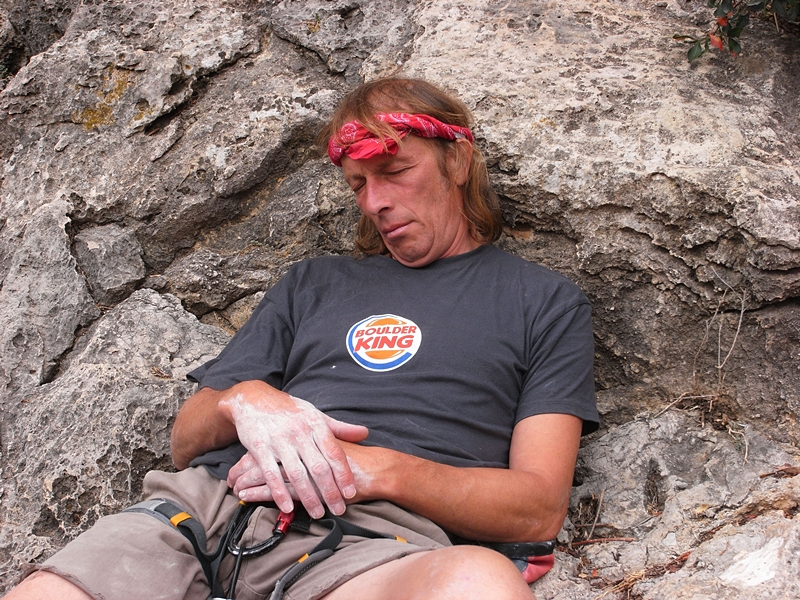Earlier in the year I met Steve McLure and after the usual banter – what have you been getting up to and what have you fallen-off ? (that’s me not Steve) – it wasn’t long before the topic of conversation turned to the different aspects of climbing. There was a familiar exchange exploring the nuances between sport climbing and what we now call trad climbing.
‘Nick, it’ll help your climbing no-end if you do some sport climbing.’
‘That may be so Steve, but it won’t feed my soul.’
The conversation then turned to how bouldering and training would improve my climbing: ‘You should boulder and train more, and it will help your climbing.’
‘That may be so Steve, but it will make me too strong and I’ll rip the holds off most of the routes I aspire to climb!’
Where Steve and I did agree, however, was in that fact that climbing needs characters if it is to keep its soul. This led us to the big question: is climbing slipping down the icy slope to mainstream, conservative mediocrity and, in doing so, is climbing losing its characters?
I have been climbing now for nearly twenty years. From the start, my passion for the mountains has been fuelled by the likes of Tom Patey, John Barry, Chris Bonington, Alan Rouse, Hamish McInnis, Alex Macintyre, Joe Brown and Paul Pritchard. Their writing is all about exploration and adventure, sacrifice, suffering, skin-of-the-teeth survival and total commitment.
Think of Chris Bonington and Doug Scott emaciated and broken crawling from the Ogre; think of Tom Patey, snow blown and hypothermic; or Paul Pritchard creeping across a crumbling Red Wall, his deep dark eyes peering out from a duvet jacket. These iconic images cannot fail to quicken the pulse and to inspire. But what would be said today about Patey and Pritchard, neither of whom was wearing a helmet? Both look strung-out and at the limit as they push into territory unknown while being dressed for the wrong occasion. I suspect that in the climbing climate of today they would be castigated as reckless risk takers by those who set themselves up as opinion makers and market leaders.
I find myself laughing – and on occasion despairing – when I read threads with titles like ‘Helmets’ on the internet forums. Inevitably there will be someone preaching about how foolish it is not to wear a helmet, ‘Oh, how foolish, they could injure themselves and cost the country thousands in medical costs.’ Bloody hell, and I thought climbers were free spirits and you know … wild? ‘Oh, that Nick Bullock, what a fool, he doesn’t wear a helmet when rock climbing.’ No I don’t, and that’s because I wear one for most of the winter – I’ve regularly slept wearing a helmet (I mean on a mountain, not in a bed… now that would be weird) and I hate them, and if I don’t want to wear a helmet in the summer when I rock climb, I won’t. Crazy I know, and yes, I appreciate I may be injured, but I don’t cast judgement on anyone who wants to wear a helmet. When I last looked, rock climbing was for free thinking people with a spirit of adventure: people who should be allowed to make their own decisions without fear of castigation from the health and safety brigade.
Now I don’t smoke,do wear a seat belt, eat healthy food, jog, and take vitamins. Is it going to be law soon to wear a helmet while climbing; to have your gear inspected once a year; or to fill out a risk assessment form before uncoiling your rope? How long before personal insurance becomes mandatory, and the failure to wear a helmet renders it invalid? Maybe it should be made illegal to climb loose rock, wet rock, or to attempt new routes that have not been properly tested by a suitably qualified person. Before we know it, it will be illegal to climb to the first bolt without stick clipping it, or heaven forbid, to boulder without a pad.
This would be funny, if it weren’t so serious. Modern climbers just don’t appear to be questioning or dangerous or anti-authority any more. They have become politically correct and conform and join in with the castigation when someone doesn’t toe the line. People like Don Whillans and Jim Perrin and Ed Drummond would surely be ostracised nowadays by the crowds who don’t understand that climbing needs to be avant-garde.
Climbing has become too serious and too professional. I say this with trepidation because I am a sponsored climber myself and I know that my comments will be misinterpreted by the skim readers who will call me a hypocrite. I suppose I would argue that actually I am sponsored more because of my lifestyle and the adventure aspect of my climbingthan for my rather unimpressive list of numbers. But, as the standards in climbing have increased, it does appear that many of our top climbers have become dull. Whatever happened to the likes of John Redhead, Steve Bancroft, Pete Livesey, Paul Nunn or Joe Tasker, all very good climbers, but more than that, all big lively characters? We need them now.
To make a living out of climbing today you need to take it very seriously and be involved with an aspect that can be measured by a number or a stopwatch. As a result, far too many of our role models are chasing numbers, not seeking adventure. In today’s high calibre, number chasing world it is deemed an advantage if you diet, train, diet, train, train, diet, train, not drink, not party, not go out and have a crack, not go on big trips, not climb in winter, not go more than a week away from the gym and certainly not go out and shuffle along ledges on adventure climbs. Not doing all of the above, in my opinion, makes Johnny and Jenny very dull boys and girls, which in turn makes climbing very uninteresting and stale.
Today life in Britain is making climbers and climbing sensible. Britain is a nanny state, a cotton wool country. It’s cheaper for the government if we are all squeaky clean and we all have mortgages. This makes us all live in fear and become beholden to the powers that be. Climbing is becoming mainstream, it’s becoming too popular and trendy and it sucks, because then it becomes regulated and the masses, without much appreciation of what climbing should be, in my mind, start to make the decisions. I blame Coca Cola and Silvester Stallone, and Red Bull and Clint Eastwood and anyone who beatifies, what is, after all, a dirty business.
Once again I know I will be called a hypocrite as I have accepted money from big business, but I would say that I have never made climbing out to be anything other than what it is which is, a dirty and sometimes serious game to be enjoyed by the participant. It is not a squeaky clean healthy option to be used to sell a product and that’s why I will always struggle to fund my trips and my lifestyle.
Climbing walls are also a double edged sword. I’ve spent hours in climbing walls and I love them, I think they are great for training on wet days, but that is what they are, they are training. Going outside for the first time after learning to climb purely in a wall must be terrifying. ‘Must wear a helmet, must follow all of the safety precautions, must look for the blue hold, the red hold, the green hold, must make decisions for myself, move up to what may be a hold, but may not be a hold, must move up without clipping a bolt.’
It’s no wonder people from this type of background cannot comprehend what it is like to go for it on a climb consisting of loose rock or wet rock and with poor protection. Being wall trained must have an effect on the person’s attitude. And that, over time, will make an impact on climbing overall as more and more people from this background become the majority.
What ever happened to – let’s get out and have it, let’s explore and use our imagination; let’s have a scare and a mini adventure? This ‘proper’ climbing experience, in my opinion, should be the first step in the learning curve not the last. Obviously, there are still many climbers who do have adventures, who want to mentally test their metal, but this type of climber is, I’m sure, a dying breed and the more climbing numbers increase and popularity turns climbing into a nice safe something to do to lose weight between the aerobics and yoga classes, we are doomed to have far fewer real climbing characters.
Climbing has many facets and we are told we have to unify and support all facets, but I believe competitions and being included in the Olympic games is everything true climbing is not, it is rules and uniforms and numbers and scores and in the end it will be the death of adventure climbing and adventurous climbers.
Finally, the internet, God I love the internet, but how many times do you read, ‘What are the conditions like on this crag, or that crag, or this hill, or this climb? Where has all the imagination gone? How about taking a chance, check it out for yourself? But then again, that could be a waste of valuable time and as everyone works so hard and time is so precious, we don’t want to do that. Climbers of today need certainty and certainty in my mind spells the death of adventure and the death of adventure spells no character and no character spells the demise of climbing as we know it.
So, what’s the solution? How about, let’s make a law that will force folk to climb outside, on grit and without an instructor. Let them build their own belays and place their own wobbly gear and shake their way up a climb. And then, before they can be allowed into a climbing wall, they have to do the theory exam and answer questions like, is it compulsory to clip the first bolt on a sports route? And the final part of the theory would be compulsory viewing of Seb Grieve climbing Parthian Shot in the DVD, Hard Grit, or Ricky Bell in On-Sight, lobbing off his route at Fairhead. With that thought in mind, and Ricky’s words at Fairhead ringing in my ears – ‘f*#k, fu~k, fu#k, let me down’– I’ll gingerly and safely get down off my high horse, taking care not to fall, and go climbing on something adventurous, maybe wet, or even loose heaven forbid, and set my mind to wondering – whatever happened to?











hey man, this is awesome, im captain of the bangor uni climbing club next year and this is the exact attitude needed by every member. next time im cragging and wondering whether or not to commit to a move or jump on a line that looks terrifying i will think of this article and fucking give it my all!!! i hope this inspires many others as much as ut has me.
Ach, the characters are there – just not the ones making a name for themselves in most cases. And anti-authority? Climbers are as varied, in my experience, as the rest of society. I prefer the anti-authority ones so I hang out with them but many seem to think there is no point, that there is no alternative to the status quo. Climbing then can become escapism from an unjust world. And finally, as you point out, there are those who are part and parcel of the commodification of climbing, helping the drive for profits through promoting brands via new routes, preferably on “new” cliffs. This variety becomes obvious as soon as anyone comments on anything vaguely political (cragging beside an Israeli settlement in the West Bank; shooing birds off nesting ledges; power drilling a way up seemingly impossible cliffs, usually in poor countries, etc). Does any of this matter? Well, I certainly agree with your concerns about regulation – it could be the end of climbing as we have been privileged to know it. But in the greater scheme of things, in a country run by racists, in a Europe that prefers drowned corpses to refugees, no I don’t think climbers per se matter very much.